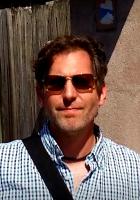The Eyes of the Inmate
The courts had scheduled the date long before, but the time, an hour always left to the warden, had yet to be decided. When asked, he uttered the only hour that made sense: midnight. But he didn’t say midnight, which would have been clear and precise. Instead he said twelve, which might seem clear enough, but the warden was a nervous man and this produced a steady stutter, so instead of saying twelve, he said twe-twelve, which his deputy, opting not to ask for clarification, understood to mean 12:12. And so it happened that the warden’s first execution took place at twelve past midnight, as did all the ones after.
Darkness passed more slowly than the daytime. When sleep came, fitful as it was, it always came at some point past 12:12. During wide-awake stretches, the warden would search for something, a turning point, perhaps. He wanted to believe he had somehow changed, that he had not always been this way, but knew he had not changed much. Then he thought of the next execution, a man who tried to end his life before the warden could do it. This part, even if only this part, the warden understood. He thought the inmate had, in all likelihood, not changed that much, either.
The warden’s eyes darted between the man strapped in the chair and a mirror that took most of one wall, which he and everyone else knew was not really a mirror, but it acted as mirrors do and therefore presented a reflection. He looked at himself in the mirror, then at the man whose life he was about to end and saw the similarities. They were both nervous, though neither let it show. Then the prisoner asked something of the warden no one had ever asked before. He asked the warden to take his hand.
When the warden was a boy, the ice beneath him broke and birthed him into cold water. His body stiffened and he shot a hand toward the hole he had just fallen through. He wished someone would take it, pull him out of the crazy mess he had gotten into. And someone did. Someone reached for his hand, so the warden reached for the inmate’s hand. They both squeezed and just by looking into the eyes of the inmate, the warden knew his thoughts, which were the same as the warden’s thoughts: that they were not all that different. Each of them held the hand of a killer.
Established practice called for the warden, when the time had arrived, to flash a thumbs-up in the direction of his deputy, which signaled he was clear and the switch could be flipped. He locked eyes with the man whose hand he held, thought about icy water, and realized change had come at last. It was twelve past midnight. The warden lowered his head and without freeing his hand, flashed thumbs-up with the other.

Foster Trecost writes stories that are mostly made up. They tend to follow his attention span: sometimes short, sometimes very short. Recent work has appeared in Fiction Kitchen Berlin, Spelk, and The Journal For Compressed Creative Arts (Matter Press). He lives near New Orleans with his wife and dog. Foster recommends the Restaurant Employee Relief Fund.


